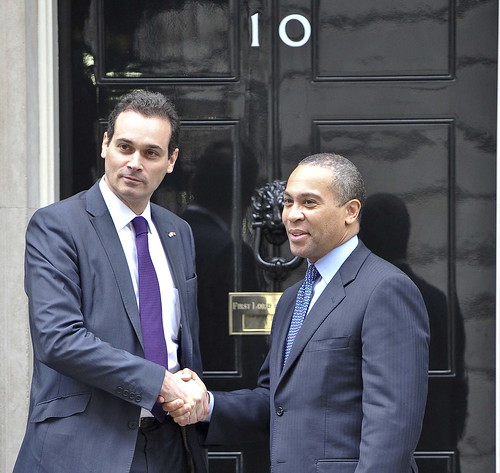7th June 2011
From shared history to mutual prosperity in Boston: Linking the UK and Massachusetts innovation industries
The following is a guest blog by Phil Budden, British Consul General to New England
History matters up here in Boston, as I was reminded when the Governor and I hosted a business event at the Massachusetts (MA) State House on Beacon Hill. While I was focussing on our current UK-MA business links, some in the audience were clearly concerned about the return of the British to Beacon Hill. (Thank goodness I hadn’t brought Redcoats!) I digressed briefly to underscore that it was British Puritans who settled Boston and set up the beacon on that hill in 1630: our shared heritage of almost 400 years ran much more deeply than the brief dispute of the American Revolution – and our current relationship was both special and essential, as the US President had confirmed during his State Visit to the UK.
Getting back to business, I recapped the highlights from the recent UK trade mission of Governor Patrick , and highlighted the modern UK-Massachusetts business relationship.

Having the Governor host us at the State House helped ensure a great turnout, as the photos below show. In fact, we had over 300 businesses turn up for the event, leaving standing room only.


Governor Patrick set out for the audience what he had seen in the UK, namely an innovation economy like that of Massachusetts, with world-class universities (he saw Imperial and Cambridge), high-tech clusters (like ‘TechCity’ in east London) and a Government committed to fostering innovation and entrepreneurship (like his own). Meetings in No10 Downing Street confirmed all this at the highest levels.

Lest the businesses at the forum not take our word for it, we organised a panel of Massachusetts firms which had invested in the UK (like EnerNOC and Zipcar) to confirm that their investments were prospering there and that ‘Britain is open for business’.

On the trade mission, we focused on our shared interests in key innovation industries, such as high technology, life sciences and clean energy. Cambridge (England) is a ‘hub of innovation’ just like its daughter city and namesake in Massachusetts, and the origin of that tradition of innovation, research and education. Extensive links already exist between institutions such as Harvard, MIT, and now UMass with Cambridge University and Imperial College London. These are important not only in the pursuit of basic science, but the application and development of the new high-tech companies necessary for a knowledge-based economy.

We also covered two other key components of the innovation economy – namely financial services and venture capital. Both are vital to innovation economies, and financial services firms were a key part of the meetings in the City of London, including Liberty Mutual, State Street and RBS (which owns Citizens), among others. The venture capital community was a vital part of the visit in both London and Cambridge, exploring opportunities to invest in each others’ world-class innovation.
A second panel of UK companies invested in Massachusetts praised the spirit of collaboration and well-educated workforce that has helped their businesses thrive here. UK-based Cambridge Consultants (which created 50 jobs after the Governor’s visit) and Shire Pharmaceuticals all have significant operations in the Bay State, and the success of British businesses here is clear from the fact that over 40,000 Massachusetts residents go to work for a British company each day. At the State House in Boston, we were pleased to announce UK-based Sagentia’s plans to create 25 new jobs in Massachusetts.
In the other direction, over 250 Massachusetts-based companies have already invested in the UK, an impressive record that reflects the UK’s business-friendly environment and similar innovation-centric economy. Britain is also Massachusetts’ largest market for exports.
The UK-Massachusetts business relationship is in great shape, as demonstrated by our UK-MA business forum last week. We look forward to continuing to build upon the mutual prosperity of the UK-MA innovation economies, as we go from strength to strength.